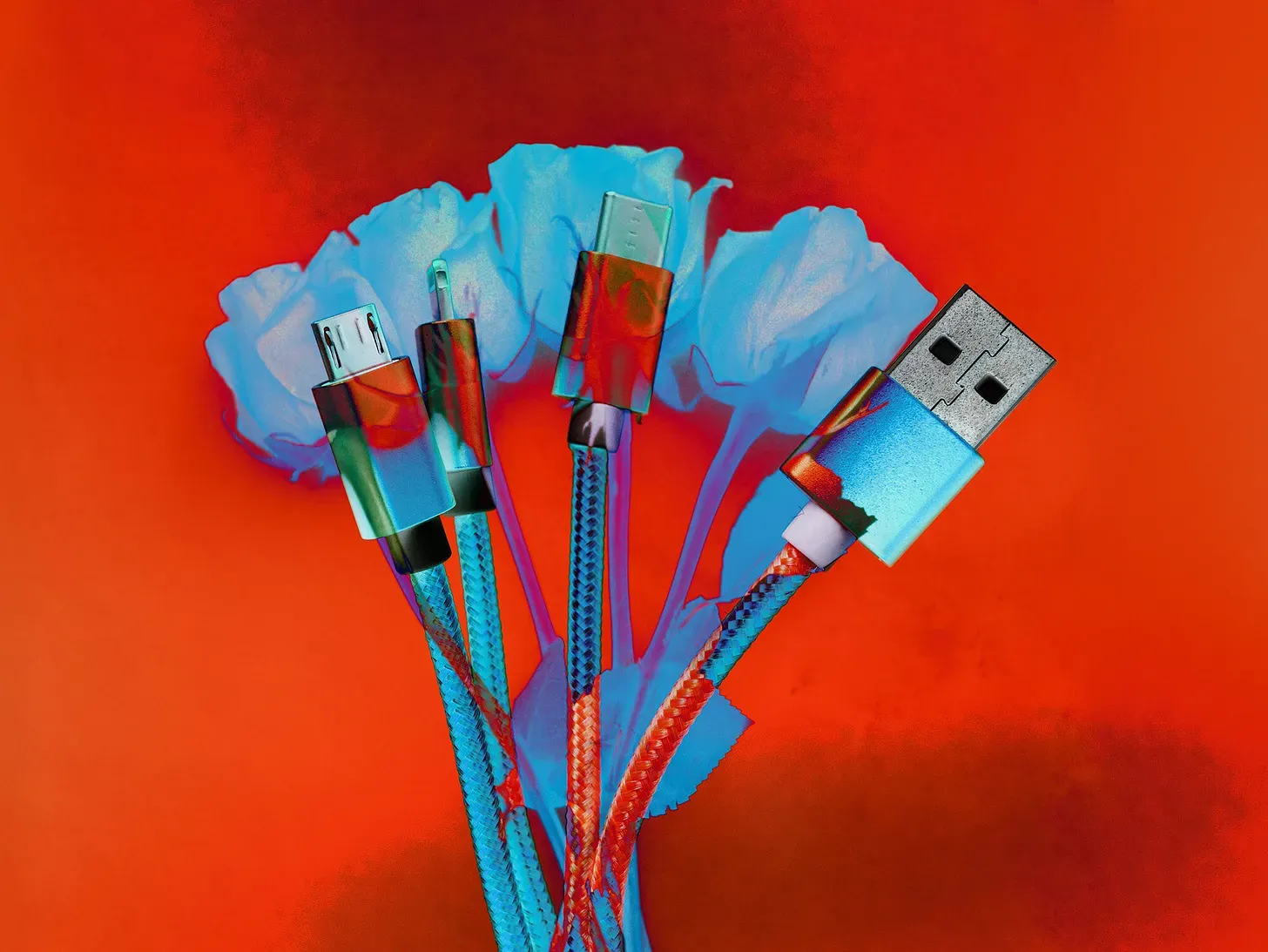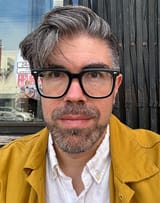Resist the Coarse Filter

I feel that the dormant goodwill in people needs to be stirred. People need to hear that it makes sense to behave decently or to help others, to place common interests above their own, to respect the elementary rules of human coexistence. They want to be told this publicly. They want to know that those ‘at the top’ are on their side. They feel recognized and cultivated. For it to develop and have an impact it must hear that the world does not ridicule it. – Vaclav Havel
The phrase written on a scroll and gripped by an Eagle on the seal of the United States – E pluribus unum, "out of many, one," – refers to the rise of the 13 colonies into a single nation. But it is also an apt description of the role of the single point of information in a wall of competing signals: the teetering between your message and the messages of millions streaming across screens simultaneously.
At the scale of an image, a noisy JPEG might resemble a grayscale blur. Keep zooming in, though, and you can see the colors of individual pixels. That's the difference an abstraction makes. It can turn a million colors into a single grey blob.
A diverse and vibrant democracy is noisy. Only autocratic governance allows for streamlined, albeit false, clarity – wherein unum is a unity of signals, and the multi is the noise that is filtered out. All bodies become fused into the body of the state, its boundaries give shape to this body, and that which is not within that body is disease. So states the myth of fascism.
What I've seen in America over a decade is the overwhelm of signal, and a desire for clarity of purpose, that has steered it to desire what we might call "the great filtration," a simplification of complexity that does not make it manageable (as technology once promised) but rather, to make complexity disappear. In some ways, this is a bipartisan concern.
If any of this asserts some form of confidence in my assessment, some veneer of authoritativeness, let me say: I'm not even certain that anything I have to say here is correct, or accurate, or reasonable. But I think that our political problem in America is not a political problem at all. It is a set of unresolved, deeply personal issues, a problem of disconnection and mistrust, that has resulted from a mass simulation of politics. This simulation offers politics as personal expression: a vote is a retweet, demonstrating one's identity rather than an endorsement for any suite of policies. While this "identity politics" claim is hurled so often at the Democratic coalition, it is more deeply entrenched into the right.
Balint Magyar suggests that "Trump promises that you don't have to think about other people." It is too simple to suggest that X, or any social media network, has isolated us from the need to care about each other. But the election of Donald Trump shows us that threats to immigrants and migrants, trans and queer people – but also political enemies, such as Nancy Pelosi, were a non-issue for a large number of voters.
Who is this promise for? What conditions lead people to desire, or be ambivalent to, people being rounded up at their homes and deported? I suggest that this is some way of resolving a cognitive noise that exists in a large number of Americans, a personal, individualized form of free-floating anxiety with no recognized cause. Trump has tapped into this anxiety and linked it to a proposed cause: a range of vulnerable people and "elites." From the fuzzy noise of anxiety, an image appears upon which this anxiety can be hung. Trump moves this previously unarticulated noise from within the mind and gives it shape and definition: the problem, he says, are the bodies of other people.
Trump serves as a filter for the fuzzy boundaries of this anxious noise, giving it a shape, and perhaps this is his appeal. There are many reasons to be uneasy these days. Fuzzy uncertainty is embedded in our world and our modern information environment. It shapes our relationship to the social and environmental changes surrounding us. Trump's ability to cut through that noisy information environment—to say whatever gets attention—suggests he has power over it.
In the face of disorienting change, I strive to identify my place in the order of things. I want to reaffirm the persistence of my own identity, I want to be anchored to something solid and stable. I want a center. It seems that for many, this noise of the other threatens to destabilize their center.
For the multi to become unum, our politics must either learn to accommodate living with one another or filter out those who challenge the comfort of the majority. If one opts to filter people out, only to see they persist at the peripheries, then the denier resorts to coarser filters. They filter them not just from media but from the state. I prefer the former: that a nation built (imperfectly) on the idea of living with each other – of coming to grips with the many ways in which one might live a life – requires us to exist among those whose decisions we may not understand, or perhaps not agree with, or even like.
Noise represents vibrancy and energy, but it is also dissipation; it is possibility and erasure. Nonetheless, in its presence, we have to adapt. Should we handle uncertainty through isolation, or through solidarity?
The bleak promise of Donald Trump is in the coarseness of the filter. America will soon return to policies designed for the false moral clarity that comes from cruelty – the legal demonization of trans people, the deliberate separation of children from their parents, the threat to use the military on those who protest these policies, and threats to arrest those who vocalize opposition. The false moral clarity of cruelty emerges because one with power can exercise it over others. Therefore, the powerful can reassert themselves as the operator, not the subject, of power.
I have heard many say they don't believe Trump will do what he told us he will do. Whether or not these threats are realized, the impact of such language on human beings – particularly those declared to be noise by the Trump worldview – is real. Therefore, even the words and threats exert a kind of power. They demand that the source of noise become compliant. If they are not compliant, this is seen as evidence that they must resort to exerting of physical power.
The disregard for the effects of our words on others is what we would call, definitionally, coarse: the texture of this administration is rough, the tone of the announcements vulgar and demeaning. This is by design. It clarifies which of our neighbors is within the center, and which of our neighbors is a source of noise.
In most faiths and moral codes, there is some semblance of the idea that we are, somehow, meant to love these neighbors. I believe that all people possess the miracle of their own existence, and no one needs to do anything more than that to "earn" a sense of value. At the heart of human rights is this right to human dignity. Without it, if governments require you to fulfill specific criteria to be granted dignity, the state diminishes dignity for all of humankind. We should never suggest that humanity is negotiable nor tie it to paperwork. Dignity is meant to be afforded to the worst and best of us as human beings, equally and unconditionally. It applies to those with power and those without. In such a view, just rules protect those without power from those who wield it irresponsibly.
The Automated Autocrat
I've lived my life according to values directly opposed to the coarsening of things. I suppose I am supposed to write about artificial intelligence, and I worry about it, too, in the coarsening of our world. The influence of Elon Musk shows his interests: a belief that AI will one day destroy the planet, paired with a company founded on the premise that AI should be "anti-woke," that is, that it should inherit the worst biases of historical training data. But AI is tested against biases to ensure technology doesn't harm those without power from those who can wield it irresponsibly. We know that the same people have proven, over and over again, to be most harmed by it.
AI already coarsens the world, and the risk of it is in believing in its coarse vision. It shows us humanity as limited to the most reductive categories dictated by some classification system we have no say in. It sorts according to the most powerfully represented and sorts the noise out. The logic of artificial intelligence is structured on the idea that we do not need other people: that we do not need to work with the process of creativity, which strives when it strays from the strict filters of capitalist business hours and productivity demands, or to work with creative people. The machines will do it, and the machines will do it faster, and who cares where the human mind ends up?
Where does dignity go when a nation strips it from neighbors and refers to them not as human beings but as "illegals"? Where does dignity go when a system is designed to consider you not as a human being, but a category – a piece of data to be processed?
Dignity is cultivated by extending it. I become more human when I push myself to find the humanity of others. But I suspect, by that calculus, that humanity is also diminished when we alienate ourselves from the miracle of our own existence.
Dignity is cultivated by extending it. I become more human when I push myself to find the humanity of others. But I suspect, by that calculus, that humanity is also diminished when we alienate ourselves from the miracle of our own existence. As soon as we decide dignity is negotiable, we begin to ask: what claim do I have to dignity? With dignity, we can empathize and find common ground with the people we share our space with. When people deny dignity to others, don't they worry about their own claims to dignity? Worry about what justifies their actions over those they deem unworthy? And so, would they not demean and diminish further those they have power over, if only to justify this original divestment of dignity, escalating the capacity for cruelty?
But this fear of change, this fear of a fuzzy planet, is unsolvable. It is universal that we must adapt to the changes of the world, mourn what we have lost, and move on. To do so requires work, but it is not political work. Such work must be done within one's self, and until it is, it will motivate the assertion of dominance and control over the lives of others as a clarifying force.
What makes you a 1, and me a 0?
The Resistance
I will need to find other ways of expressing these values, chief of which is living them. I'm trying to think about resisting the coarsening. It is not just the use of curse words in a presidential speech or the "tone" of the campaign, as it successfully used shock and vulgarity to break out of the noisy information environment. But it is in the coarsening – the rough filtration – of individual human dignity and value, and what is made possible when this dignity is stripped away.
I do not understand why people hate immigrants, or trans people, or protesters or anyone else on the list. Perhaps it isn't all hate. Hate, after all, is an acknowledgment of the "other's" presence. What if the largest subset of Trump voters were steered not by hate but through ambivalence to the suffering of others? What if the noise of this democracy has encouraged a tuning out of the experiences of others, rather than their active removal? In either case, the result is categories of people deemed ignorable, the qualities of their inner experiences reduced to a bullet point on the cons list.
It seems vital, then, to cultivate the opposite of an averted gaze within myself. Relationships can be a form of resistance. When groups of people are named and targeted with laws that restrict certain rights, they are, by definition, far more vulnerable than those who are not. Who is assigned to these categories is arbitrary. To protect the humanity of others in all cases is a way to preserve the flame within myself. Whatever I think is being stripped from this world, in the course of this cruelty, I have to strive to maintain it through demonstration. When care is snuffed out, it's up to those of us who can to reignite it. Tactics may change, but I want no part in shaping the perception that any life is meaningless.
This is not to shame anyone for being angry or unforgiving, nor to demand that anyone at risk put themselves in a position of harm. Neither should the demand for universal dignity be an alibi for inaction or for capitulating to racist or misogynistic compromises. It is a reminder that my values are fundamental. I want to preserve these values—the belief in the dignity of human lives—within myself, even as I take action.
I'm angry! I am not particularly concerned with constraining my response to accommodate Matt Gaetz's humanity. I want to keep alert to the tendency within myself to abstract the world into flat textures: that not everyone who voted for Matt Gaetz to happen is Matt Gaetz, that Matt Gaetz is toward the hard end of a spectrum, not a universal set of convictions shared by 50.2% of the people I see on the highways or grocery stores.
I need to believe that people can be offered a way out of the fear that inspired this simulation of politics. Perhaps this solution is not what we have come to call politics, and what we need is a return to politics: a form of work and engagement and presence that creates information in ways beyond the digital information sphere, an information that moves from one body to the next, assuring each other that this shifting world is why we have relationships in the first place, and that politics is a means of expressing concern for the safety and thriving of those we are in community with.
If you are reading this in your inbox, it means I have successfully migrated away from Substack. The new archive for this newsletter can be found here.
If you're looking to escape from X, I recommend Blue Sky. It's now at a level of polish that rivals Twitter's glory days. If you sign up through this link, you can immediately follow a list I've hand-assembled with 150 experts in critical thinking about AI.





